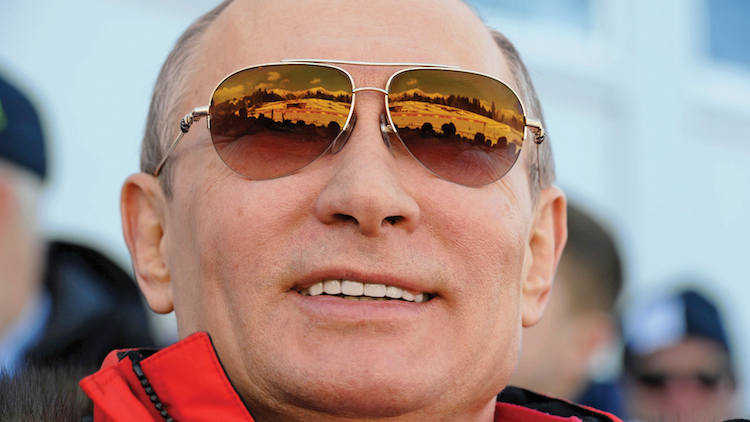Boycott Russia and boycott the world
Gays have it better in Putin’s Russia now than at any previous moment in its history
Russian President Vladimir Putin watches the cross country skiing men’s relay during the Sochi 2014 Olympic Winter Games at Laura Cross-Country Ski and Biathlon Center near Krasnaya Polyana February 16, 2014. REUTERS/Mikhail Klimentyev/RIA Novosti/Kremlin (RUSSIA – Tags: POLITICS SPORT OLYMPICS) ATTENTION EDITORS – THIS IMAGE HAS BEEN SUPPLIED BY A THIRD PARTY. IT IS DISTRIBUTED, EXACTLY AS RECEIVED BY REUTERS, AS A SERVICE TO CLIENTS – RTX18XI0
Share
Much of the controversy over the location of these Olympic Winter Games has orbited around the Russian government’s treatment of gays and lesbians. As a Cold War kid, I find this delightful. Nobody said much about these matters when Russia was Communist, homosexuality was formally illegal and the Russian psychiatric profession was a torture apparatus. In school, we were lectured about Western disarmament for what must have been a hundred hours, if you add it all up. I do not recall spending a second on Russia’s sexual minorities.
If you are cynical, you will regard this as demonstrating how fashion-driven the issues of international concern are. If you believe in progress, it shows how much our species has pulled its act together. Gays and lesbians, unquestionably, have it far better in Russia now than at any previous moment in its recorded history. Homosexual activity is legal; gays can donate blood, join the army and adopt children. Transsexuals can change their legal gender.
The unlimited exercise of these privileges is not easy in a Russian environment dominated by: conservative Orthodox sentiment; insecurity about the moral effects of capitalism; and a histrionic political strongman. And now Russia has come under fire because its federal legislature chose an awkward moment to criminalize the dissemination of “propaganda for non-traditional sexual relations” to minors.
That touches on freedom of expression, whose essential role in the liberal-democratic formula we in the West are still learning to appreciate. The artists and creatives have been particularly clamorous about the Russian gay-propaganda law because expression is their business. Without disputing the justice of their cause, one would have to admit that the wedge issues have sure shrunk since the days of gulag and terror.
Certainly, it is remarkable how much attention President Vladimir Putin has gotten for being beastly to the gays—relative to how little he has received for picking an Olympic site that is a symbolic middle finger raised to everything that is not Russia. No one feels the need to use scare quotes when describing Sochi as being “Russian”; only a few late-arriving scholars have noted that the resort is in a land cleared of various indigenous mountain peoples in the late 19th century. This was intentional genocide, a planned, violent, largely successful destruction of nationalities. Those Circassians who were able to dodge the Cossacks fled to Turkey and eventually encountered the ethnic homogenization program of Atatürk. Bad fires to be caught between.
So, holding an Olympics in Sochi amounts to endorsing, almost ratifying, a fairly recent act of horrendous ethnic cleansing. Some would say the same of the 2010 Games in Vancouver. But present-day Sochi does not just represent the purulent explosion of European man over the face of the globe: It is also Stalin’s seaside hideaway, built for the relief and pleasure of the vanguard of “scientific” socialism.
Simon Sebag Montefiore’s Stalin: The Court of the Red Tsar might be the best book ever written about the Soviet Union. If you turned it into a play, you would have to set it in Sochi. Once his power was secure, Stalin, during peacetime, conducted the Soviet orchestra of murder from Sochi for much of each year. Being sent to out-of-the-way Sochi was a mark of favour when the boss was in residence there, and a hair-raising danger when he was not.
Stalin, a greater destroyer of peoples than any tsar, created Sochi because it was close to his native Georgia. He wanted to be in the south, but not actually among the old neighbours who would have remembered him as a particularly diabolical child. To Putin in 2014, Sochi signifies the endurance of a great Russia, one shed of “Soviet” encumbrances, and free to pursue a strictly national destiny. The empire is gone, but Russia still holds much of what the emperors and the Communists gained.
It is amusing how little we hear, as Putin is being vilifed, of the old Olympic ideal of the fraternity of nations. If we were to boycott Russia over a nasty gay-literature law, we could hardly hold an Olympics anywhere. And most of the legally recognized states harbour, or have extinguished, at least one conquered, resentful people. We take a deeper, more cynical view of this fractal world fabric than the founders of the Olympics did. We enjoy the Games for their own sake, without expecting that they will transcend, much less ameliorate, international politics. This is almost certainly a good thing.
